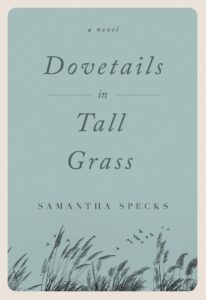 Today’s special guest is historical fiction novelist Samantha Specks and we’re chatting about Dovetails in Tall Grass.
Today’s special guest is historical fiction novelist Samantha Specks and we’re chatting about Dovetails in Tall Grass.
Bio:
Samantha Specks is a clinical social worker who has worked on a child/adolescent psychiatric unit, as a Dialectical Behavioral group therapist with adults and adolescents, and as an outpatient psychotherapist. She currently lives in Texas, but her heart and mind remained in Minnesota, her home state, while working on Dovetails in Tall Grass, which is her debut novel. Her happy place is reading a good book or watching a terrible TV show with a cup of tea and her leggings covered in dog hair. Sticking with the theme of strong young women, Samantha and her husband welcomed a baby girl to their family while she was writing this novel.
Welcome, Amanda. Please tell us about your current release.
Inspired by the true story of the thirty-eight Dakota-Sioux men hanged in Minnesota in 1862—the largest mass execution in US history—Dovetails in Tall Grass is a powerful tale of two young women connected by the fate of one man.
As war overtakes the frontier, Emma’s family farmstead is attacked by Dakota-Sioux warriors; on that same prairie, Oenikika desperately tries to hold on to her calling as a healer and follow the orders of her father, Chief Little Crow. When the war is over and revenge-fueled war trials begin, each young woman is faced with an impossible choice. In a swiftly changing world, both Emma and Oenikika must look deep within and fight for the truth of their convictions—even as horror and injustice unfolds all around them.
What inspired you to write this book?
Though Dovetails in Tall Grass is about events in 1862, for me the story started on Christmas 2005. A bitter wind blew snow over a country road. I was a high-schooler, cozy riding in my parents’ Suburban making the final turn to my grandparents’ home, when my blue eyes spotted something new. Headlights illuminated shapes moving across the darkening horizon. A group of men on horseback. Curious, I asked my parents why people were riding in the cold. My mother explained: “They’re Dakota who are marching to show they haven’t forgotten what happened here long ago.” Since that winter night, I’ve spent the last 15 years of my life learning what they haven’t forgotten. And just like Emma and Oenikika, I’ve grappled with the complex history of the place I call home and finally found the courage to use my voice to tell this story.
What exciting story are you working on next?
My current project is the sequel to Dovetails in Tall Grass — Dovetails of a River — set at the Battle of the Little Bighorn. The events that happened in 1876 are so compelling; I’m writing fast as can, I can’t wait to talk with readers about this next one!
 When did you first consider yourself a writer?
When did you first consider yourself a writer?
When someone asks me “what do you do for work?” I hesitate and fumble my words, “Well… I write but,” I shake my head and shrug my shoulders. But? Such an awkward response. I will have to discuss this reaction with my therapist in our next session.
Do you write full-time? If so, what’s your work day like? If not, what do you do other than write and how do you find time to write?
Pre-baby and post-baby (I had a baby last pandemic, I mean, last year!) writing routines look different. Pre-baby, I’d write based on my level of inspiration and was always able to submit more words than I’d aimed for at each deadline with my editor. Something like 30-40 pages every two weeks. But since having a kid, I’ve had to get more efficient with my work time: I plan backward from my deadlines, block writing hours on my google calendar, and assign scenes to each block. Then I masterplan childcare coverage to overlap those writing hours. It’s usually a few hours, four days a week, to squeeze out 20 pages per deadline.
And, of course, my own pressure to be more efficient often makes me less efficient. After a writing session that turned into a rabbit hole of historical research (try reading scholarly articles on water cisterns in the 1870s) and then an hour of me googling “toys for a baby who can only roll to the left” I get a version of the “Sunday Scaries” that I call the “Writing Scaries” and start a negative and self-critical shame spiral. Driving away from the coffee shop, I think to myself, “You imposter! You watch terrible reality TV and don’t read literary fiction. Sometimes spellcheck cannot even tell which word you are attempting to spell! Who are you kidding trying to write a book?” I arrive home to find that I missed my baby rolling to the right for the first time – and my brain screams, “YOU CANNOT WRITE THIS BOOK.”
But time passes and shame slinks back into the shadows. I’ll see an interaction between people at the grocery store that reminds me of something my characters would do, I’ll read a research book, then listen to a podcast; my brain starts to tick. And, sure enough, “story” begins to bubble up and I just can’t keep it down. My heart sings out, “YOU CANNOT NOT WRITE THIS BOOK! IT IS YOUR TRUE CALLING!” and I’m off to Starbucks at six in the morning to cram in a Saturday morning writing sesh.
In summary: I go to a coffee shop and ride a roller coaster of the “Writing Scaries” about four times a week.
What would you say is your interesting writing quirk?
I’m not sure if it’s a quirk… but I’ve done much of my historical fiction writing in major urban areas. New York City, Houston, LA… and I’m guessing I was the only person sitting on Marina Bay in Singapore while researching “farming implements of plains settlers during the 1860s”.
As a child, what did you want to be when you grew up?
When our family’s car was stopped at a stop light, I was in my booster seat, looking out the window from the backseat. My mother says that I would ask her about the people in the car next to us. Things like: “Do you think they’re having a good day?” and “Aren’t you sad we’ll never get to know them?” I’ve always wanted to find out more about other people, so it’s no surprise that my career path has included broadcast journalism, social work, and writing fiction.
Anything additional you want to share with the readers?
I’d love to connect on social media. Add me on Instagram or Facebook!
Links:
Website | Amazon | Instagram | Facebook
Thanks for being here today, Samantha. Happy writing.
